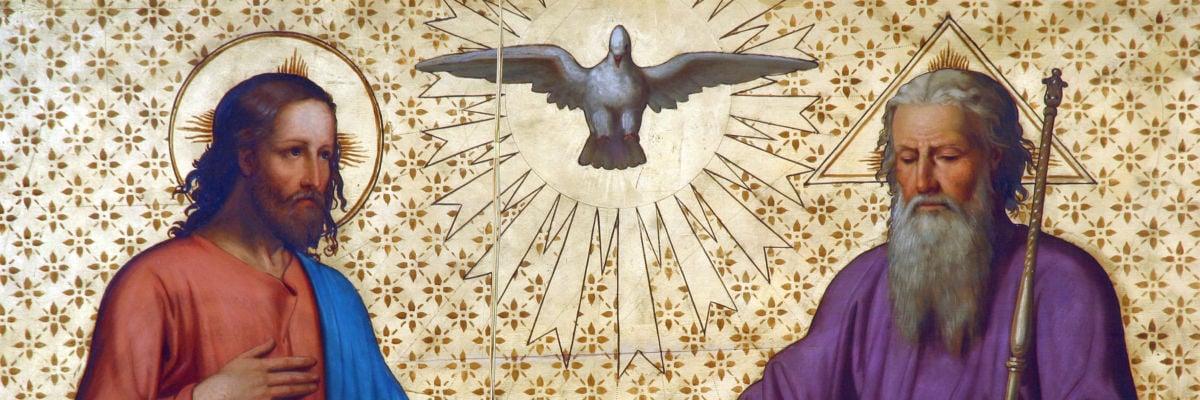
Catholic apologist Joe Heschmeyer joins host Thomas Graf to address a caller’s doubts about the Trinity, particularly whether Jesus is truly equal to God the Father or simply a created being. Joe unpacks the biblical and theological basis for Christ’s eternal divinity, clarifying how Catholics understand Jesus as fully God and fully man.
Transcript:
Caller: And he says in the Scriptures that the Father is greater than him and he was made lower than the angels, and he didn’t consider himself equal to God. And so the main thing was that he doesn’t do his own will. He does the will of the Father. He is the Word. In a different way, I would say he’s a clone of God. The Holy Spirit is with him, with the Father.
Joe: So just. Can I clarify a couple things about your views? Is it your view that the Holy Spirit is divine? I’m sorry, is it your view that the Holy Spirit is divine like the Holy Spirit is God?
Caller: And I believe that Jesus is divine because he’s the Word made flesh. He created the whole earth, the God’s Word.
Joe: Okay, so you think he does pre-exist? It sounded earlier like you said he didn’t exist until he was in the womb of Mary.
Caller: He existed as the Son, as the Word of God, but he didn’t exist as a human person of the egg of Mary until he was born of Mary.
Joe: Sorry, I’m trying to clarify, because we don’t think that Jesus is a human. We believe he’s a divine person of the human nature. So let’s go through you mentioned First Corinthians 15, I think, which I alluded to earlier.
So in 1 Corinthians 15, verse 25 has that line, for he must reign until he has put all his enemies under his feet. That is a quotation from Psalm 110. Now Psalm 110 is actually the most quoted Psalm and most quoted verse, Psalm 110, verse 1 in the New Testament.
And one of the times he gets quoted is in Matthew 22. And in Matthew 22, Jesus poses this question. He says, what do you think of the Christ? Whose Son is he? And the Pharisees say, he’s the son of David.
And then Jesus says to them, how is it then that David, inspired by the Spirit, calls him Lord, saying, the Lord said to my Lord, sit at my right hand till I put thy enemies under thy feet? If David thus calls him Lord, how is he his Son? And no one is able to answer.
So the point Jesus is making is that on the one hand you have all this biblical evidence that the Messiah will be of the lineage of David. He’ll be a descendant of David, and in his humanity, Jesus is that. And if that’s all it was, okay, fair enough.
Except we have these other biblical passages like Psalm 110, verse 1, which speaks of him pre-existing. The Lord says to my Lord, he’s talking about the dialogue between the Father and the Son. And so David can talk about God the Father conversing with God the Son before the incarnation of Christ, which only works if he is an eternally existing, pre-existing divine person.
And so when we talk about the Word is with God and the Word was God, this shouldn’t be understood as a vague concept. The Greek word there, Logos, is the ordering principle. In this case, the ordering principle of the universe is where words like logic come from.
So it is through Christ that the entire cosmos comes into existence, not as some vague swirling myths of myth, but as an actual person. The second person of the Trinity, who you are right, he takes on a human body and we now encounter him in Jesus of Nazareth in a new way.
And so the name Jesus, that’s new. But the second Person of the Trinity, that’s not new. He was already active. And you can find him literally on the first page of the Bible when God says, let us make man in our own image.
And then the relationship of male and female, this dynamism is something not just a monad, is one of the things that points to the interior life of the Trinity, that there’s something in human relationships that reveals something about the essence of who God is.
Because if we take seriously the idea that God is love, as Scripture says, well, love isn’t just a selfish thing where I just love myself. Love is the outpouring of lover to beloved. And God doesn’t become love when we come into existence. God is love. It is his essence. It is who he is, this eternal outpouring.
And so, yes, one way of speaking of that is the Father speaks the Son from all eternity. Another way is that the Father loves the Son into eternal existence. And the Son loves the Father back. And the fructose, the fruit of that love is the Holy Spirit, not, but he is begotten, not made, as the creed says.
But I think it’s important to get all of that biblical data straight because you’re absolutely right. If you take just part of it, you could come away thinking either Jesus is God and not man, or that he’s man and not God, or that he’s man in something a little less than the full God of God, or because the Father does send the Son, but the Son nevertheless presents himself as equal to the Father.
Last point I’d make here in John chapter five, when he calls himself the Son of God, one of the reasons they want to stone him is because they recognize that this made him equal with God. This is John 5, verse 18. That son of God doesn’t mean less than God. You know, if you’re the son of a human, you’re a human. You’re not something less than a human.
So to be the Son of God was not something less than. They recognized it as a statement of divine equality. And that is exactly right. It is. That makes sense.
Caller: Well, I would love to talk to you another time, but I’m just saying he doesn’t know when he’s coming back. He doesn’t do his own will. He does the will of the Father. He is the Word of God. He is the Son of God, and he’s the Savior of the world. But he’s not. He’s going to lay down that baton at one time because all his power was given to him and he’s going to give it back.
Joe: So when you read those passages, they’re typically talking about one of two things. Sometimes they’re talking about the humanity of Christ, which is inferior to his divinity and is inferior to the divinity of the Father. Like Jesus’ humanity, even though it’s perfect, is not eternal, it’s not infinite. And so he can say the Father is greater than I in the comparison of divinity to humanity.
There’s also a sense in which we want to recognize that as the second Person of the Trinity, Jesus is sent by the Father and not the other way around. But this is not about one of them having more power or more glory or more honor or more divinity than the other two.
But it is about what the relationship is of the three persons that the Father begets the Son and he breathes the Spirit through the Son. And if you get that wrong, then we don’t understand the three persons.
Because, look, the three persons, the only way to make sense of them is by their relationship to one another, meaning that all of them are perfectly one God. This is the whole notion of the Trinity. They’re three in one, in one essence.
So what’s the difference between the Father and the Son and the Holy Spirit? They’re not three separate infinite sets, logically impossible. And they’re not three separate gods. That’s the paganism that the entire Old and New Testament stands against and condemns.
That rather, the one God has relationality within who he is. So when we talk about the three persons in one essence, that’s three who to in one what that divinity isn’t like humanity, like in your humanity, you’re one person or one body. It’s uncomplicated. Divinity isn’t like that.
And if we’re expecting it to be like that, then we’re going to end up misunderstanding the biblical evidence on this. So you’re right, the Father sends the Son, but that doesn’t mean that the Father is more God than the Son is, or more powerful than the Son is. Something else is going on there, and it takes a little more digging to kind of make sense of that.
But I agree. I hope you do keep calling in. These are very good questions to grapple with, and I hope this is at least a little bit helpful.
Joe: Yeah. Bjorn, thank you so much for that call. We would love to continue that conversation. We do need to get to more callers, though, so please, please do feel free to call in again.



